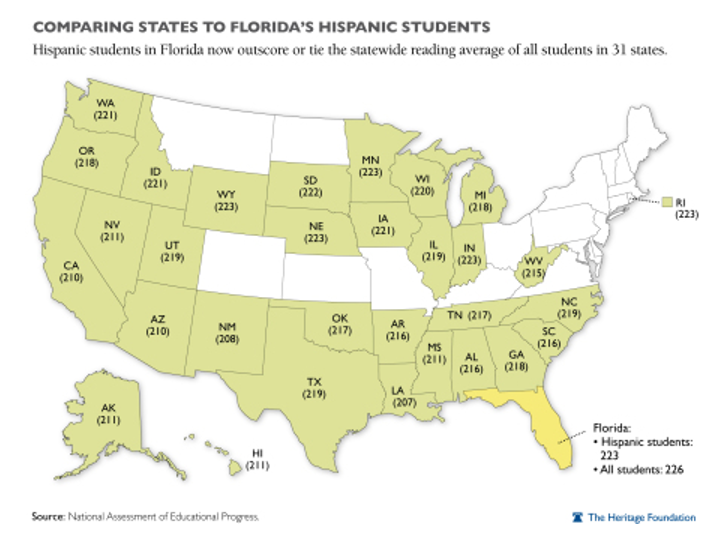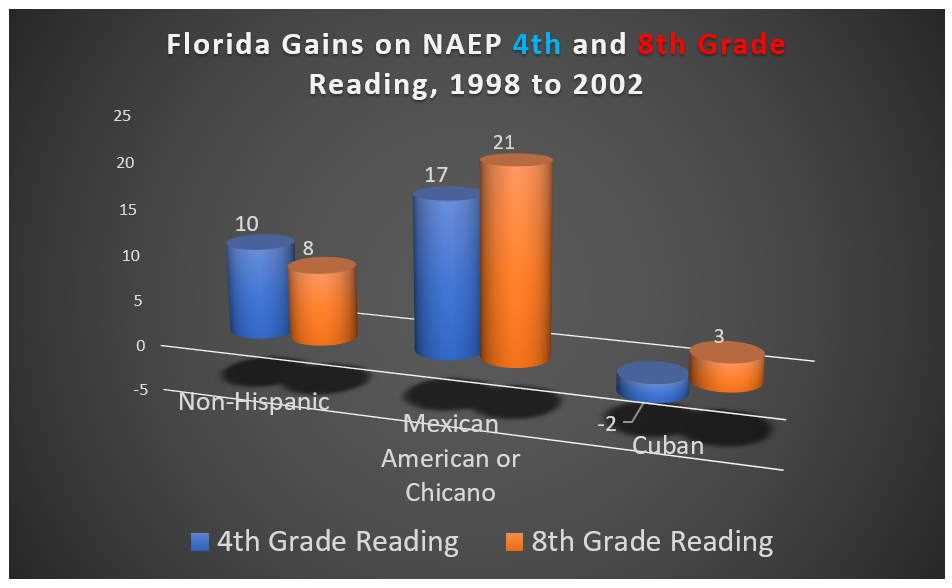 You, dear reader, look as though you could use some distraction from the viral apocalypse. Like many good stories, this one flashes back to the past to inform the present.
You, dear reader, look as though you could use some distraction from the viral apocalypse. Like many good stories, this one flashes back to the past to inform the present.
A decade ago, while an analyst at the Goldwater Institute, I participated in a debate concerning choice versus curriculum reform. Yes, people were confused about whether those things were mutually exclusive a decade ago, as they are today. (Spoiler alert: choice helps curriculum reform).
In any case, the debate prompted me to ask myself which states had done a lot of both choice and testing accountability. This in turn led me to look closely at the NAEP scores of Florida and to consider that former Gov. Jeb Bush had aggressively sought to improve literacy instruction by creating a variety of public and private choice mechanisms.
Staring at fourth-grade NAEP scores by race/ethnicity on my computer screen, here is what I discovered.

The conversation around K-12 in Arizona at the time frequently involved an “if you control for student demographics, we are kind of average” story. This was part of a fable with a thousand faces; you will hear different versions of it in different states. In Arizona, the story involved kids immigrating from Mexico who were unable to read Spanish. In Minnesota, I’ve heard tales told in hushed voices about Hmong kids. In more than one southern state, I’ve heard allusions to scores of white kids scoring quite high when they weren’t anything of the sort. The details vary, but the moral is always the same: “We here in state X, we’ve got the really hard-to-educate kids.”
The fact that Florida’s Hispanic students were reading approximately a grade level higher than the average for all students in Arizona required the development of a new rationale. That new rationale was the magic Cuban theory. Florida’s Hispanics are Cubans, the story went, and they are wealthy. “Obviously we can’t expect to do that with our Hispanic students,” the theory concluded.
I related the magic Cuban theory to an audience at the first ExcelinEd conference held in Orlando. Given the advantage of local knowledge held by many audience members, the crowd laughed out loud at the absurdity of the stereotype. Despite living in a distant patch of cactus, I had spent enough time in the Florida Keys with my grandfather to develop a lifelong taste for ropas viejas and to know better.
The magic Cuban theory could never survive scrutiny. First off, Florida’s Hispanic community is vastly more diverse than appreciated by distant stereotypes, with Cubans constituting a minority among Hispanics. Second, Florida saw large increases in literacy among multiple ethnic groups. Magic Haitian theory anyone?
Finally, buried deep in the data explorer, NAEP has a variable that allows you to break down Hispanics by subgroup. NAEP, alas, discontinued this variable, but we do have it for both 1998 (the year before Jeb Bush took office) and 2002. It would have been great to have data from additional years, but note that the 2002 NAEP came before the adoption of the third-grade retention policy. Between 1998 and 2002, Florida policymakers had adopted major education reforms, but not all the reforms.
Here is what the gains looked like during the 1998 to 2002 period.

Florida’s Cuban-Americans scored well, but they were not driving gains. As a rough rule of thumb, 10 points on NAEP exams approximately equals an average grade level’s worth of progress. In other words, we would expect a group of fifth-graders given the fourth-grade test to do about 10 points better. The Mexican-American gains were very large, very meaningful and very statistically significant.
By the way, those eighth-graders from 2002 are approaching their mid-30s now. With all of today’s troubles, and considering those around the bend, Florida chose wisely in not succumbing to the soft bigotry of low expectations, instead making an all-out effort to teach literacy. Life is hard, but life is really hard if you can’t read.


